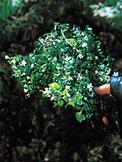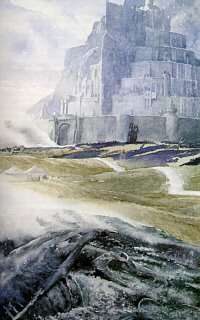ROTK: Bk 6, Ch 6
"'Here then at last comes the ending of the Fellowship of the Ring,' said Aragorn"The next two chapters cover the journey home for Frodo and his friends and were written by Tolkien in one continuous text. The division comes when the hobbits stay for a while at Rivendell. That is the point where "Many Partings" ends and "Homeward Bound" begins. The separation into two chapters is appropriate in the context of refocusing the narrative on just Gandalf and the hobbits, with the remaining characters having said their goodbyes.
In mid-July, Frodo tells Aragorn that he is anxious to return home. The King assures him that in a week's time they will set out northwards. The Fellowship will ride together for one last time. The occasion would be Eomer's return to Gondor for the purpose of bringing back to Rohan the body of Theoden, who has been
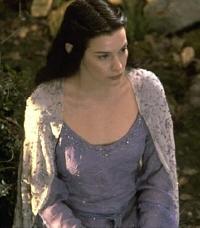 lying in state in the Rath Dinen. Before they set out, Arwen gives a gift to Frodo. She tells him that because she has chosen a mortal life with Aragorn, her place on a ship sailing to the Undying Lands will be unused.
lying in state in the Rath Dinen. Before they set out, Arwen gives a gift to Frodo. She tells him that because she has chosen a mortal life with Aragorn, her place on a ship sailing to the Undying Lands will be unused. "'But in my stead you shall go, Ring-bearer, when the time comes, and if you desire it. If your hurts grieve you still and the memory of your burden is heavy, then you may pass into the West, until all your wounds and weariness are healed. But wear this now in memory of Elfstone and Evenstar with whom your life has been woven!'And so on July 19th, the funeral escort of Theoden set out. Merry, as the King's squire, rode in the wain that carried the body. In the company rode Aragorn and Arwen, Frodo and Sam, Legolas and Gimli and Gandalf astride Shadowfax. Also, Celeborn and Galadriel rode with Elrond and his sons. Pippin accompanied the Princes of Dol Amroth and Ithilien and the other Captains and knights of Gondor. When the company reached Edoras, Theoden King was honored and laid to rest in the barrows where his forefathers lay. Eomer was hailed as the new King of Rohan and, at a feast in the Golden Hall of Meduseld, he gave his blessing for the betrothal of Faramir and Eowyn.
And she took a white gem like a star that lay upon her breast hanging upon a silver chain, and she set the chain about Frodo's neck. 'When the memory of the fear and the darkness troubles you,' she said, 'this will bring you aid.'"
 Arwen did not journey any farther and said her final bittersweet goodbyes to Elrond. Faramir and Eowyn remained at Edoras as well. But the rest continued on, stopping first at Helm's Deep. Remembering their agreement, Legolas joined Gimli for a tour of the Glittering Caves of Aglarond, behind the Deep. From there they went to Isengard to find that the Ents had torn down all of the stone wall that encircled it and planted gardens in the land within. They learned from Treebeard that the old Ent had allowed Saruman to leave some seven days earlier. Treebeard believed that since the war was over Saruman was no longer capable of any mischief; "A snake without fangs may crawl where he will," he said. But Gandalf suspected that Saruman's one remaining tooth - his voice - was what was able to persuade the Ent to let him leave. Aragorn told Treebeard that the vale now belonged to the Ents to do with what they wished as long as they agreed to see to it that no one entered Orthanc without leave of the King.
Arwen did not journey any farther and said her final bittersweet goodbyes to Elrond. Faramir and Eowyn remained at Edoras as well. But the rest continued on, stopping first at Helm's Deep. Remembering their agreement, Legolas joined Gimli for a tour of the Glittering Caves of Aglarond, behind the Deep. From there they went to Isengard to find that the Ents had torn down all of the stone wall that encircled it and planted gardens in the land within. They learned from Treebeard that the old Ent had allowed Saruman to leave some seven days earlier. Treebeard believed that since the war was over Saruman was no longer capable of any mischief; "A snake without fangs may crawl where he will," he said. But Gandalf suspected that Saruman's one remaining tooth - his voice - was what was able to persuade the Ent to let him leave. Aragorn told Treebeard that the vale now belonged to the Ents to do with what they wished as long as they agreed to see to it that no one entered Orthanc without leave of the King.Now it was time for Gimli to return the favor and he and Legolas turned east to visit Fangorn Forest once more. They bid farewell to their friends. The company journeyed on towards the Gap of Rohan, but when they arrived very close to the spot where Pippin had looked into the Orthanc-stone, Aragorn announced that he would ride no further. He said his goodbyes, reminding Pippin that he was still a knight of Gondor in the service of the King. He also told them that he would one day visit his lands to the north and see them again.
"With that they parted, and it was then the time of sunset; and when after a while they turned and looked back, they saw the King of the West sitting upon his horse with his knights about him; and the falling Sun shone upon them and made all their harness to gleam like red gold, and the white mantle of Aragorn was turned to a flame. Then Aragorn took the green stone and held it up, and there came a green fire from his hand."
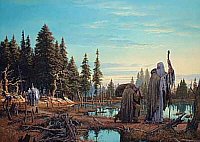 Now Gandalf, the hobbits and the Elves turned north into the land of Dunland and it wasn't long before they came upon Saruman and Wormtongue. The old man was now dressed in rags, as a beggar, and his servant groveled like a dog at his feet. Galadriel, once a fellow member of the White Council, offers him forgiveness one last time and the wizard refused in his arrogance. He had harsh words for the hobbits, warning them that the might not "find things good" when they returned home. Kicking Grima and ordering him along, he went away off into the woods.
Now Gandalf, the hobbits and the Elves turned north into the land of Dunland and it wasn't long before they came upon Saruman and Wormtongue. The old man was now dressed in rags, as a beggar, and his servant groveled like a dog at his feet. Galadriel, once a fellow member of the White Council, offers him forgiveness one last time and the wizard refused in his arrogance. He had harsh words for the hobbits, warning them that the might not "find things good" when they returned home. Kicking Grima and ordering him along, he went away off into the woods.Saruman's words of the Shire concerned both Gandalf and Sam, but Frodo insisted that they must first visit Rivendell for he greatly missed Bilbo. As they reached the entrance to the pass of the Redhorn Gate of Caradhras, Celeborn and Galadriel set off eastwards over the Misty Mountains to return to Lothlorien. Since the Ring had been destroyed and the power of the Elven ring Nenya waned, that land would soon diminish and Galadriel would have to make preparations to leave Middle-Earth forever and take the ship over the Sea.
 Now the last of the remaining party reached the valley of Rivendell on September 21st, the day before Bilbo's One Hundred and Twenty-Ninth birthday. Gandalf and the hobbits stayed there for about two weeks, enjoying the hospitality of Elrond and the Elves. In the beginning of October, Frodo and his friends made ready to set out on the final leg of their journey home. Gandalf agreed to ride with them as far as Bree. When they said goodbye to Bilbo, the old hobbit said he was growing very tired and he asked Frodo if he would gather up all his notes and papers and finish his book for him. Frodo was delighted to accept.
Now the last of the remaining party reached the valley of Rivendell on September 21st, the day before Bilbo's One Hundred and Twenty-Ninth birthday. Gandalf and the hobbits stayed there for about two weeks, enjoying the hospitality of Elrond and the Elves. In the beginning of October, Frodo and his friends made ready to set out on the final leg of their journey home. Gandalf agreed to ride with them as far as Bree. When they said goodbye to Bilbo, the old hobbit said he was growing very tired and he asked Frodo if he would gather up all his notes and papers and finish his book for him. Frodo was delighted to accept.The next day, October 5th, Frodo said farewell to Elrond. The Elf wished him a safe journey but told him that he need not worry about rushing back to visit Bilbo because it would not be long before he would ride out with him to the Shire on a westward journey towards the Sea. Frodo understood. He did not share Elrond's words with his companions.
------
[Chronology: Mid-Year's Day through October 5th 3019 T.A.]
------
Next: Homeward Bound
(revised 11/10/06)














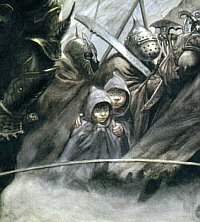








 Dain had become King-Under-The-Mountain at Erebor after Thorin Oakenshield was killed in the Battle of the Five Armies as is told in "The Hobbit". They were still under siege on the morning of March 25th, when Aragorn led his army up to the Black Gate.
Dain had become King-Under-The-Mountain at Erebor after Thorin Oakenshield was killed in the Battle of the Five Armies as is told in "The Hobbit". They were still under siege on the morning of March 25th, when Aragorn led his army up to the Black Gate. 
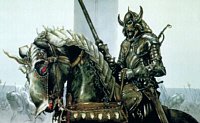

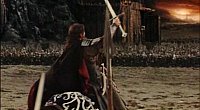

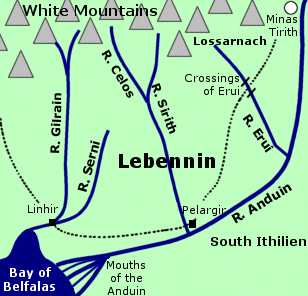


 But Legolas and Gimli had seen the grave faces of Aragorn and Gandalf that morning and they knew that Mordor still threatened the Free Peoples, despite the victory. There was a meeting taking place to decide what to do next.
But Legolas and Gimli had seen the grave faces of Aragorn and Gandalf that morning and they knew that Mordor still threatened the Free Peoples, despite the victory. There was a meeting taking place to decide what to do next.